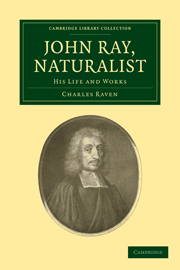Book contents
- Frontmatter
- Contents
- Preface
- Introduction
- ABBREVIATIONS
- Chapter I Boyhood and Youth
- Chapter II At Cambridge University
- Chapter III First Studies in Science
- Chapter IV The Cambridge Catalogue
- Chapter V The Years of Travel
- Chapter VI The English Catalogue
- Chapter VII The Years of Varied Output
- Chapter VIII The Structure and Classification of Plants
- Chapter IX The History of Plants
- Chapter X The Flora of Britain
- Chapter XI Last Work in Botany
- Chapter XII The Ornithology
- Chapter XIII The History of Fishes
- Chapter XIV Of Mammals and Reptiles
- Chapter XV The History of Insects
- Chapter XVI Of Fossils and Geology
- Chapter XVII The Wisdom of God
- Conclusion
- Index
- Frontmatter
- Contents
- Preface
- Introduction
- ABBREVIATIONS
- Chapter I Boyhood and Youth
- Chapter II At Cambridge University
- Chapter III First Studies in Science
- Chapter IV The Cambridge Catalogue
- Chapter V The Years of Travel
- Chapter VI The English Catalogue
- Chapter VII The Years of Varied Output
- Chapter VIII The Structure and Classification of Plants
- Chapter IX The History of Plants
- Chapter X The Flora of Britain
- Chapter XI Last Work in Botany
- Chapter XII The Ornithology
- Chapter XIII The History of Fishes
- Chapter XIV Of Mammals and Reptiles
- Chapter XV The History of Insects
- Chapter XVI Of Fossils and Geology
- Chapter XVII The Wisdom of God
- Conclusion
- Index
Summary
‘A good book needs no preface; a bad book deserves none.’ That is no doubt true. But when a student of theology turns aside (as it would seem) from his proper concern, when a normally active citizen in the middle of a great war fills much of his time with the life and work of a naturalist of the seventeenth century, it is reasonable that he should give some account of his eccentricity. Hence this personal explanation.
The history of science, with every respect for Mr Crowther and even Dr Hogben, has not yet been written. Nor in these days, when the use and abuse of scientific achievements are so significant, can the subject be regarded as unimportant. But my concern is not with the general record of man's discovery of the scientific method or of his application of it to the service of his needs and ambitions, so much as with one consequence of those events. As a theologian my primary task long ago convinced me of the importance of the change in man's aesthetic, moral and religious outlook which had accompanied and in large measure inspired the scientific movement. It was plain to me as a parson that the mixed folk whom I met as an entomologist and a bird-watcher had found an interest in nature which was singularly rich in educative and recreational value.
- Type
- Chapter
- Information
- John Ray, NaturalistHis Life and Works, pp. ix - xiiPublisher: Cambridge University PressPrint publication year: 2009First published in: 1942

